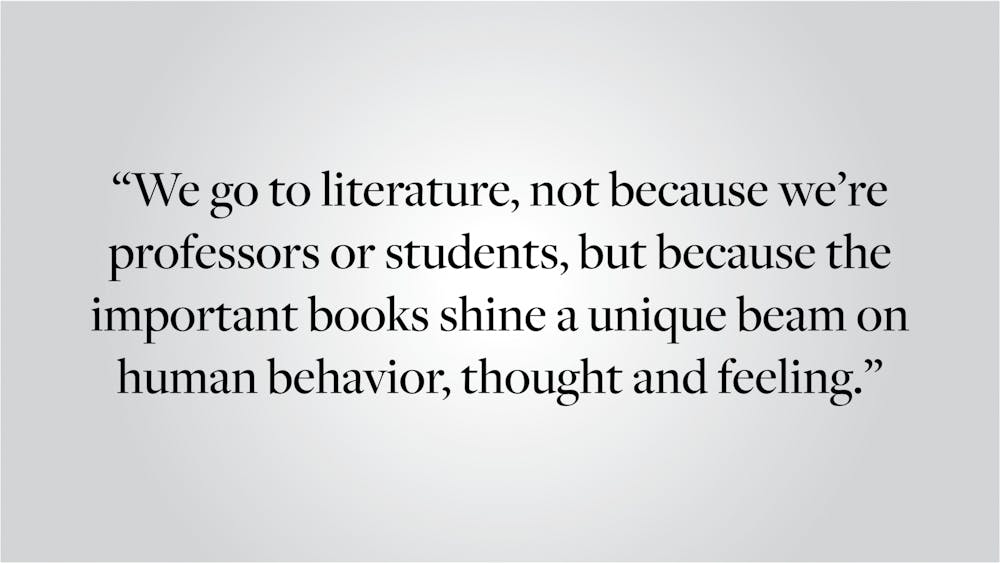One of the few virtues of being old is having a personal sense of history. If I look back in time, it jumps out at me that no one needed to make the case for literature in the past because it was self-evident that literature was alive and well in the Brown curriculum: lots of enrollments, lots of concentrators.
Those days are over. Enrollments in comparative literature courses have dropped off at Brown, as they have across the country. The old “liberal arts” model is fighting for its life, given the enormous prestige of the STEM fields and the understandable worry on students’ minds that a literature concentration might be an iffy proposition in terms of getting a job or eventually paying off one’s student debt. There are major headwinds against spending lots of time reading novels and poems.
Recently I find myself wrestling ever more with the question: Why literature? At the end of one’s career, one is plagued by just such existential questions, since they bear on an entire lifetime in the trenches, and oddly enough, we rarely answer them. To be sure, we have reams of courses dealing with cultures ancient and modern spread across the University, but have we dealt with the core issue: What do you actually learn in a literature course? I assign novels and poems and plays, and my students read those novels and poems and plays. What kind of takeaway is actually involved? And how does this stack up over the course of time? When I myself, now an old man, reflect back on the courses that meant most to me as student, many decades ago, what is it that has stuck with me, has added not only to what I know but also to who I am?
It has always amazed me that we professors are in the dark about what we have “achieved” in our classes. Shockingly, there is very little longitudinal feedback. Yes, one gets the odd email or letter from former students, but there is no actual bookkeeping of this stripe. Why doesn’t the University contact its alums, asking them every five or 10 years, “What did you learn in your concentration at Brown?” I do realize that there are alumni questionnaires which pose these questions, but my sights are on the existential as well as the informational issues. “What has your concentration meant to you?” is the harder, trickier question. My guess is that students would find it hard to give substantive answers to such queries. Literature offerings, in particular, are distinctly not “how to” or “problem solving” courses: What ends do they serve?
As an identical twin — only our closest friends in school could distinguish between Arnold and Philip Weinstein — I have a much blurrier picture of human contours than other folks do, and a stronger sense that identity is a more mobile and promiscuous item than we often realize. Further, my identity as a twin has shaped my thinking when it comes to reading literature. I’m convinced that you do not read a novel or poem in remotely the same way you read math or physics or economics — or even history or philosophy. It will sound loopy, but I believe we read literature to become other. After all, reading, say, Sophocles or the Brontës or Kafka or Morrison entails “inhabiting” — for the duration of the reading experience — those characters’ minds and hearts. No other field asks or even permits you to do this.
Now, I am well aware that this last paragraph will be rejected — likely laughed at — by most of my colleagues in Brown’s literature departments. If anything, today’s professional model urges objectivity — indeed distance — as central to our negotiations with the texts we read. To “identify” with the text is usually thought of as the trap laid for unsophisticated readers. The many schools of criticism that are represented at major universities — focusing on crucial issues of race, class and gender in their older and newer formulations, all keyed to operations of power and ideology that help shape subjectivity itself — are often suspicious of “reader identification.” So, I’m definitely the odd man out on this front. Nonetheless, I won’t back off.
Let me stir the pot even further by facing the bigger question behind all your choices at Brown, pointing to the real elephant who’s been in the room along: What’s in it for you? After all, people at Brown University have enough on their plates as is without being saddled with pious injunctions to read, read, read . . . literature. What makes it worth doing? I’ll answer that with a question I asked a friend who had devoted her entire life to doing programs on Shakespeare. My question: How much do you know about Shakespeare? Her answer: not as much as he knows about me. Not as much as he knows about me. Chew on this a little. We go to literature, not because we’re professors or students, but because important books shine a unique beam on human behavior, thought and feeling. Reading these books adds something unique not only to our database but to our actual identity. For we’re never through discovering who we are.
Arnold Weinstein Arnold Weinstein is the Richard and Edna Distinguished Professor of Comparative Literature at Brown University, and the author of The Lives of Literature: Reading, Teaching, Knowing. He can be reached at arnold_weinstein@brown.edu. Please send responses to this opinion to letters@browndailyherald.com and other op-eds to opinions@browndailyherald.com.





